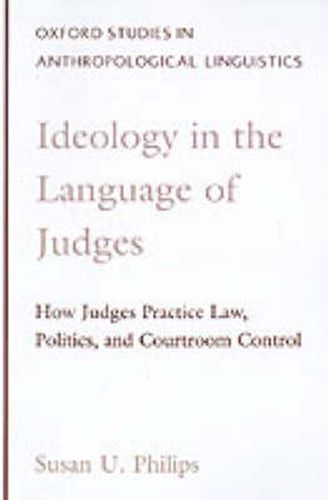Readings Newsletter
Become a Readings Member to make your shopping experience even easier.
Sign in or sign up for free!
You’re not far away from qualifying for FREE standard shipping within Australia
You’ve qualified for FREE standard shipping within Australia
The cart is loading…






A study that will appeal to any reader interested in the relationship between our language and our laws, Ideology in the Language of Judges focuses on the way judges take guilty pleas from criminal defendants and on the judges’ views of their own courtroom behavior. This book argues that variation in the discourse structure of the guilty pleas can best be understood as enactments of the judges’ differing interpretations of due process law and the proper role of the judge in the courtroom.Susan Philips demonstrates how legal and professional ideologies are expressed differently in interviews and socially occurring speech, and reveals how bounded written and spoken genres of legal discourse play a role in containing and ordering ideological diversity in language use. She also shows how the ideological struggles in a given courtroom are central yet largely hidden or denied. Such findings will contribute significantly to the study of how speakers create realities through their use of language.
$9.00 standard shipping within Australia
FREE standard shipping within Australia for orders over $100.00
Express & International shipping calculated at checkout
Stock availability can be subject to change without notice. We recommend calling the shop or contacting our online team to check availability of low stock items. Please see our Shopping Online page for more details.
A study that will appeal to any reader interested in the relationship between our language and our laws, Ideology in the Language of Judges focuses on the way judges take guilty pleas from criminal defendants and on the judges’ views of their own courtroom behavior. This book argues that variation in the discourse structure of the guilty pleas can best be understood as enactments of the judges’ differing interpretations of due process law and the proper role of the judge in the courtroom.Susan Philips demonstrates how legal and professional ideologies are expressed differently in interviews and socially occurring speech, and reveals how bounded written and spoken genres of legal discourse play a role in containing and ordering ideological diversity in language use. She also shows how the ideological struggles in a given courtroom are central yet largely hidden or denied. Such findings will contribute significantly to the study of how speakers create realities through their use of language.